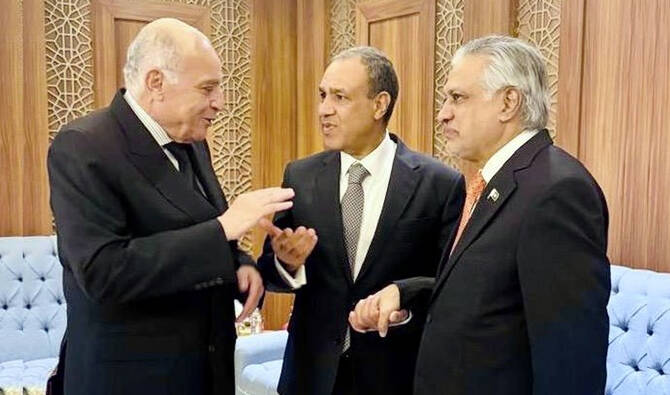
The Palestine OIC talks took center stage when Pakistan’s Deputy Prime Minister and Foreign Minister Ishaq Dar met Muslim leaders on the sidelines of the Organization of Islamic Cooperation’s (OIC) 21st Extraordinary Session of the Council of Foreign Ministers in Jeddah. Dar emphasized solidarity with the Palestinian cause while urging urgent humanitarian access, a ceasefire in Gaza, and long-term reconstruction efforts.
OIC Session Focused on Gaza
The extraordinary session, jointly called by Palestine, Türkiye, and Iran, convened in Jeddah to address the escalating war in Gaza. Member states adopted a resolution condemning Israel’s attempts to exert full military control over the Palestinian enclave. The resolution also demanded an immediate ceasefire, lifting of the blockade, and the opening of border crossings to ensure unhindered delivery of humanitarian aid.
Dar, representing Pakistan, engaged in bilateral meetings with foreign ministers from key Muslim countries, reiterating Pakistan’s unwavering commitment to Palestine and the unity of the Muslim world.
Meetings with Egypt and Algeria
On the sidelines, Dar held talks with Egypt’s Foreign Minister Badr Abdelatty and Algeria’s Foreign Minister Ahmed Attaf. He described the meeting as a “meaningful interaction,” where the leaders discussed the dire humanitarian situation in Palestine.
Dar underscored the urgency of a ceasefire and the immediate opening of humanitarian corridors. He said the three countries agreed on the importance of collective Muslim unity to confront the worsening crisis. At the same time, Dar reaffirmed Pakistan’s commitment to strengthen bilateral relations with both Egypt and Algeria through enhanced connectivity and broader cooperation in diverse sectors.
Discussion with Türkiye
Earlier, Dar also met Turkish Foreign Minister Hakan Fidan. The two leaders highlighted the urgency of relief measures for Gaza and reaffirmed their solidarity with the Palestinian people.
Dar stressed that Pakistan and Türkiye, bound by fraternal ties, would continue to cooperate closely at both bilateral and multilateral levels. He noted that the ongoing crisis required collective action from Muslim states and a stronger voice in international forums.
Wider Engagement with Muslim Leaders
Dar’s diplomatic outreach extended beyond these meetings. A day earlier, he had held discussions with leaders from Saudi Arabia, Iran, Malaysia, Somalia, and Bangladesh. These talks focused on the Middle East crisis and bilateral cooperation between Pakistan and the respective states.
During these engagements, Dar consistently emphasized the need for uninterrupted humanitarian access to Gaza. He also pushed for a roadmap to rebuild the war-torn enclave and restore essential infrastructure, including hospitals, schools, and housing.
Read: Pakistan-Bangladesh Relations Gain Fresh Momentum
Call for Humanitarian Access
The deputy prime minister underlined that the worsening humanitarian crisis in Gaza could not be ignored. He said millions of Palestinians are trapped under siege conditions, with limited access to food, water, and medical supplies.
Dar urged immediate international efforts to ensure aid delivery through open border crossings. He noted that without such measures, the humanitarian cost would multiply, leaving future generations of Palestinians at risk.
Gaza Reconstruction a Priority
Beyond immediate relief, Dar placed strong emphasis on Gaza’s reconstruction. He called on OIC members to design a collective plan for rebuilding the devastated territory. According to him, Pakistan supports initiatives that focus on sustainable rehabilitation, including restoring essential infrastructure and creating opportunities for economic recovery.
He also linked reconstruction with peace, stressing that rebuilding Gaza was necessary to restore hope and stability. Without reconstruction, he warned, the region would remain vulnerable to cycles of violence.
Unity Within the Muslim Ummah
Throughout his engagements, Dar repeatedly underscored the importance of unity within the Muslim world. He said that divisions weaken collective action and reduce the ability of Muslim states to influence international decision-making.
He urged OIC members to rise above differences and work together for the common cause of justice and peace in Palestine. According to him, the struggle of the Palestinian people is not just a regional issue but a moral responsibility shared by all Muslim nations.
Pakistan’s Broader Foreign Policy Goals
While Palestine remained the central theme, Dar also used the meetings to discuss Pakistan’s bilateral relations. He expressed interest in expanding cooperation with Egypt and Algeria in trade, investment, and connectivity. Similarly, his talks with Türkiye focused on enhancing multifaceted cooperation, including defense, economic ties, and regional security.
Dar’s outreach reflects Pakistan’s approach of integrating support for Palestine with broader diplomatic engagements, ensuring that solidarity with Gaza aligns with strengthening ties across the Muslim world.
A Shared Responsibility
As the OIC session concluded, Dar’s meetings highlighted the urgency of coordinated action. The resolutions passed in Jeddah and the bilateral commitments made on the sidelines pointed to a common understanding among Muslim leaders: the Palestinian cause remains at the heart of the OIC’s mission.
For Pakistan, Dar’s participation reaffirmed its longstanding stance on Palestine. At the same time, it showcased the country’s efforts to foster stronger bonds across the Muslim world and to push for collective solutions in the face of regional and global challenges.
Follow us on Instagram, YouTube, Facebook,, X and TikTok for latest updates
